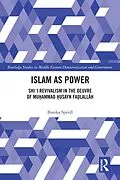Providing an in-depth and extensive analysis of the concept of power as articulated
by Muhammad Husayn Fadlallah (1935-2010), this case study analyses the
systemic conceptualisation of power and his argumentation of sacralising
Islamised power. The volume also offers a quick overview of how the concept was
understood and articulated by other Shi ite jurists such as Ayatollah Khomeini.
Examining Fadlallah's oeuvre, in particular his seminal book Islam and the
Logic of Power [ al-Islam wa-mantiq al-quwwa ], this book focuses on the narrative
itself, which played a central role in the radical transformation that occurred in the
Shi te concept of empowerment and its recognition as a necessity. The analysis
of Fadlallah's conceptualisation and argumentation illustrates the mechanism
of sacralising righteous power as well as the means of gaining it. Fadlallah
reinterpreted Shi sm as a project of empowerment to initiate and sustain an
"impulse of power" amongst the Lebanese Shi tes in the most critical moment of
modern Lebanese history.
Dealing with the concept of power in Shi te political thought from a theoretical
perspective, the study has an innovative approach that offers an insight into
how the transformative narrative is constructed and what makes it convincing.
Shedding light on the content and logical structure of Fadlallah's argumentation,
this volume will be of interest to scholars and students researching contemporary
politics, Islam, and the Middle East.
Autorentext
Bianka Speidl is a senior lecturer and researcher at the Pázmány Péter Catholic
University, Hungary. She earned her PhD from the Institute of Arab and Islamic
Studies at the University of Exeter. She spent academic years in Tunisia, Syria,
Italy, and Lebanon. Between 2013-2019 she was a research fellow in the Research
Group of Contemporary Religious Culture pertaining to the Hungarian Academy
of Sciences and the University of Szeged, Hungary.
Inhalt
Introduction
1. The Importance of Müammad usayn Fälallah in Shi i Revivalism
2. Defining Power as a System and an Intermediate Goal
3. Fälallah's Theology of Power
4. Spiritual Power as the Engine of Revolution
5. Social Power
6. Political Power
7. Ethics of Power
8. Rhetoric of Power
Conclusion
Bibliography
